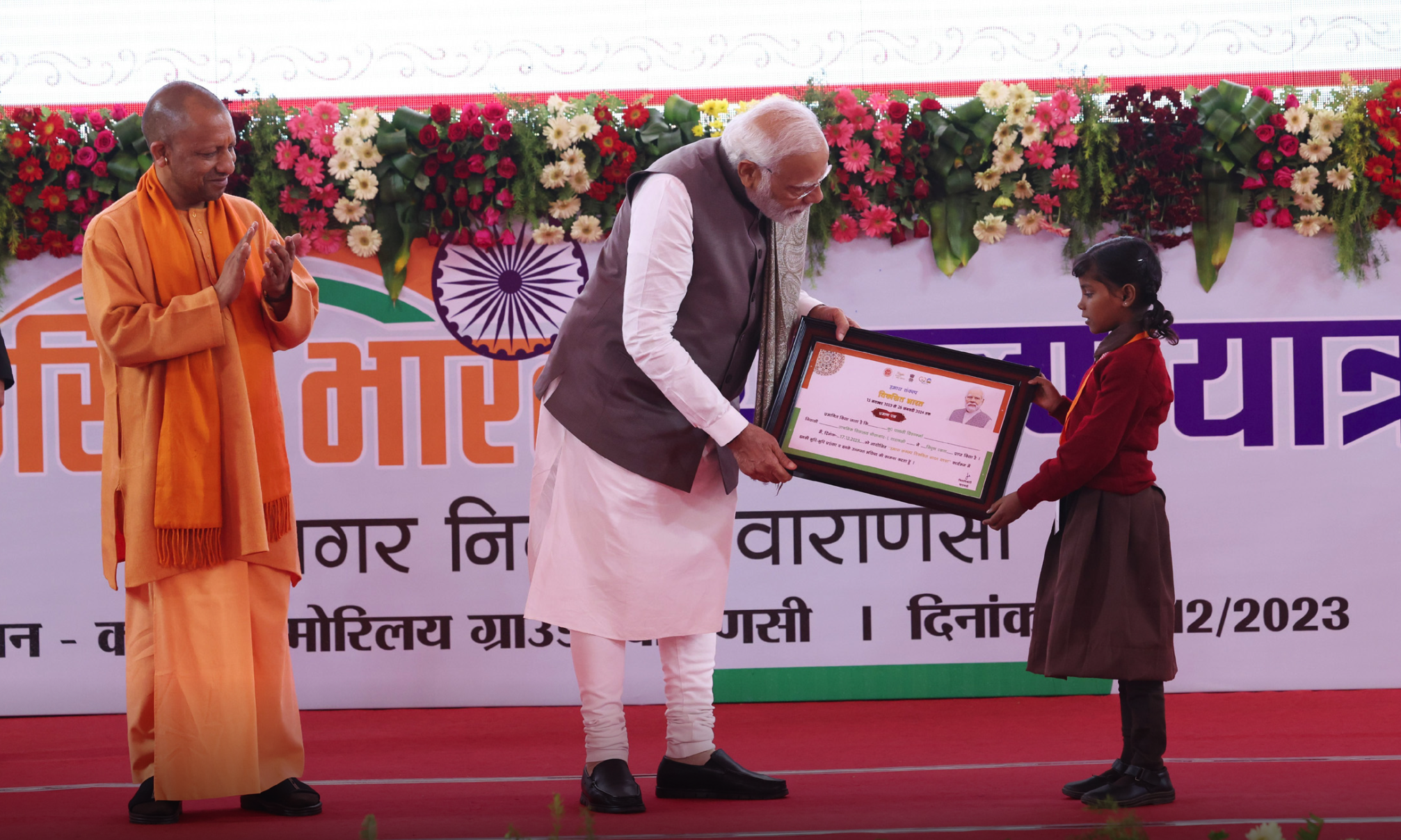PM Modi is in Varanasi to participate in the Viksit Bharat Sankalp Yatra events, and inaugurate the second edition of the Kashi Tamil Sangamams (Indian Express)

- 18 Dec 2023
Why is it in the News?
PM Modi recently participated in the Viksit Bharat Sankalp Yatra events and inaugurated the second edition of Kashi Tamil Sangamam in Varanasi.
What is Viksit Bharat Sankalp Yatra?
- The Viksit Bharat Sankalp Yatra is a government initiative being undertaken across the country, to raise awareness about and track the implementation of flagship central schemes, such as Ayushman Bharat, Ujjwala Yojana, PM Suraksha Bima, PM SVANidhi, etc.
- On the occasion of the Janjatiya Gaurav Divas, marking the birth anniversary of tribal icon Birsa Munda, Prime Minister Modi flagged off the Viksit Bharat Sankalp Yatra from Khunti, Jharkhand.
- It has four aims:
- Reach out to the vulnerable who are eligible under various schemes but have not availed of benefits so far.
- Dissemination of information and generating awareness about schemes.
- Interaction with beneficiaries of government schemes through their personal stories/ experience sharing; and
- Enrolment of potential beneficiaries through details ascertained during the Yatra.
- The program involves various Union ministries and state governments.
- In a short span of one month, the Yatra has reached over 2.50 crore citizens across 68,000 Gram Panchayats, with nearly 2 crore individuals taking the Viksit Bharat Sankalp.
What is Kashi Tamil Sangamam?
- Kashi Tamil Sangamam celebrates many aspects of the historical and civilisational connection between South and North India.
- Aligned with the National Education Policy 2020, which emphasizes cultivating a modern yet culturally rooted mindset, the policy encourages the fusion of traditional Indian Knowledge Systems with contemporary knowledge.
- This integration has yielded enriching outcomes, such as incorporating Yoga and Ayurveda into modern medicine, employing technology for traditional crafts, blending ancient Vaastushilpa with modern archaeology, and creatively interpreting classical Raagas.
- Recognizing the value of rediscovering and integrating ancient knowledge into modern thinking, the month-long Kashi-Tamil Sangamam has been initiated.
- This endeavour promotes direct interaction among scholars, experts, and practitioners from diverse fields, fostering the exchange of expertise and best practices.
About Kashi-Tamil Sangamam:
- An initiative by the Government of India under the "Azadi ka Amrit Mahotsav" and in line with the "Ek Bharat Shreshta Bharat" spirit, Kashi-Tamil Sangamam underscores unity amid the cultural diversity of states and Union Territories.
- The program aims to celebrate, reaffirm, and rediscover the enduring connections between Tamil Nadu and Kashi, two ancient seats of learning.
- This initiative provides a platform for individuals from various walks of life, including scholars, students, and philosophers, from both regions to converge, share their knowledge, culture, and best practices, and learn from each other's experiences.
- IIT Madras and BHU serve as the implementing agencies for the program.
- Following the inaugural edition in 2022, this year's Kashi-Tamil Sangamam is scheduled to take place from December 17 to December 31.
Cultural Significance:
- In the 15th century, King Parakrama Pandya, the ruler of the Madurai region, aspired to construct a temple dedicated to Lord Shiva.
- To fulfil this vision, he embarked on a journey to Kashi (Uttar Pradesh) to acquire a lingam.
- During his return journey, he paused to rest under a tree.
- To his surprise, when he attempted to resume the journey, the cow carrying the lingam steadfastly refused to move.
- Recognizing this as a divine sign, Parakrama Pandya chose to install the lingam at that very spot, giving rise to what is now known as Sivakasi in Tamil Nadu.
- For those unable to make the pilgrimage to Kashi, the Pandyas thoughtfully erected the Kasi Viswanathar Temple in present-day Tenkasi, situated in the southwestern part of Tamil Nadu near the state's border with Kerala.
What is the reason for choosing Tamil Nadu and Kashi?
- Despite their geographical separation, Kashi and Tamil Nadu share profound and vibrant historical connections that have endured through the centuries.
- Renowned as embodiments of Indian culture, these regions have been revered by many for their cultural richness.
- Historically, seekers of knowledge from various places, including Kashi, Prayagraj, Ayodhya, and Gorakhpur, in the north, and Kanchipuram, Puducherry, Madurai, Thanjavur, Rameshwaram, Srirangam, Kanyakumari, Thoothukudi, Tirunelveli, and the Tamraparani River in the south, have been drawn to these regions as significant knowledge hubs.
- The ancient ties between these two knowledge centres are evident in various aspects of life, including recurring themes in literature and the presence of the name "Kashi" in numerous villages in Tamil Nadu.
- Notably, Saint Kumaragurupara from Tamil Nadu showcased audacity in negotiating with the Sultanate of Kashi, even bringing a lion to his courtyard to reclaim Kedarghat and secure a site for the consecration of the Vishweshwara Lingam.
- His literary contribution, "Kashi Kalambakam," is a grammatical composition of poems on Kashi.
- King Adhiveera Rama Pandiyan of the Pandya Dynasty, after a pilgrimage to Kashi, dedicated a Shiva Temple in Tenkasi, Tamil Nadu, and composed "Kashi Kandam," a Skanda Purana in Tamil poetic verses.
- Exploring and rediscovering the profound links between these two centres promises to yield essential knowledge in both intellectual and practical domains.
